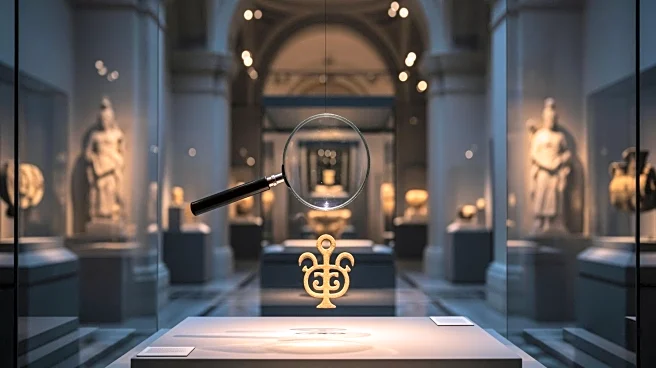What's Happening?
The recent theft of crown jewels from the Louvre has intensified calls for transparency regarding the colonial origins of the museum's collections. The stolen jewels, while crafted in France, contain gems
sourced from colonial-era territories such as Sri Lanka, India, Brazil, and Colombia. This incident has sparked a debate about the ethical implications of displaying artifacts with colonial histories. Experts suggest that the theft could lead to increased pressure on museums to disclose the provenance of their collections and address restitution claims. The investigation into the theft is ongoing, with concerns that the jewels may be dismantled or melted down due to their notoriety.
Why It's Important?
The theft highlights the broader issue of colonial-era acquisitions in Western museums, raising questions about the ethics of displaying such artifacts without acknowledging their complex histories. This could lead to a shift in how museums handle provenance and restitution, potentially affecting international relations and cultural heritage policies. The incident underscores the need for museums to provide more context about the origins of their collections, which could influence public perception and policy regarding cultural artifacts. Stakeholders such as historians, cultural institutions, and governments may need to navigate the delicate balance between preserving history and addressing past injustices.
What's Next?
The ongoing investigation may result in legal actions against those involved in the theft, while the broader conversation about colonial-era artifacts could lead to policy changes in museum practices. France may face increased pressure to follow the example of other countries that have begun returning artifacts to their countries of origin. This could involve legislative changes to facilitate restitution and greater collaboration with international bodies to address historical grievances. Museums might also adopt more transparent practices, including detailed labeling and public education efforts to inform visitors about the origins and histories of their collections.
Beyond the Headlines
The theft and subsequent scrutiny could prompt a reevaluation of the role of museums in preserving cultural heritage. Ethical considerations may lead to a more inclusive approach to curating exhibits, acknowledging the contributions and histories of the cultures from which artifacts originate. This could foster a more nuanced understanding of history and promote reconciliation between nations with colonial pasts. Additionally, the incident may inspire other institutions to reassess their collections and engage in dialogues about restitution and cultural sensitivity.









